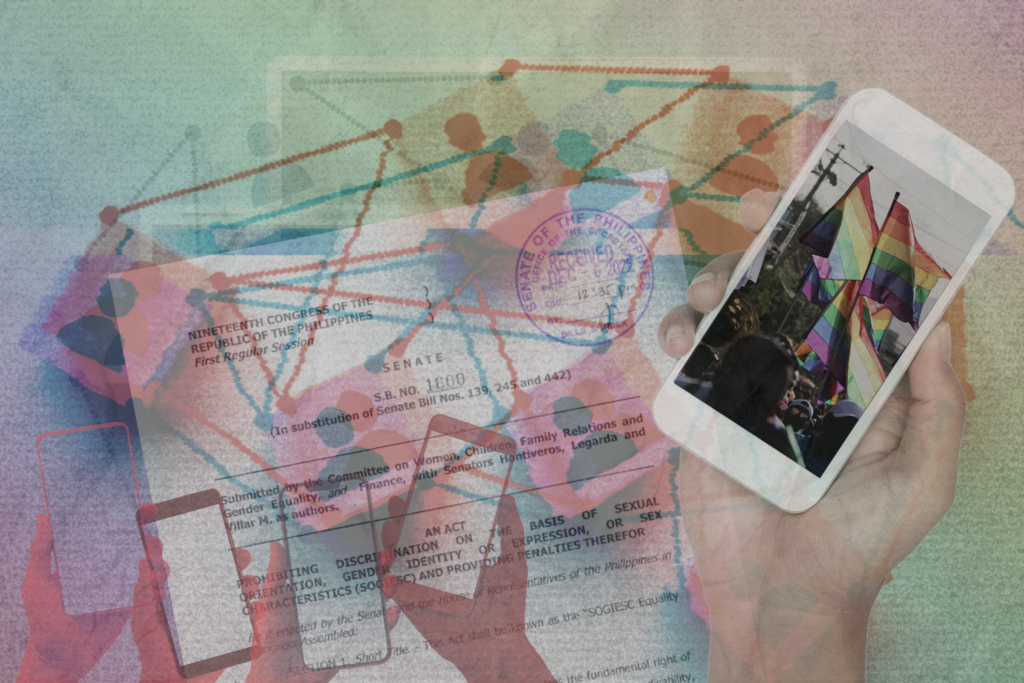Rappler identifies anti-SOGIE Bill disinformation network

CHEERS TO Rappler for its in-depth report that uncovered and analyzed the online disinformation network against the SOGIESC (Sexual Orientation, Gender Identity, Gender Expression, and Sex Characteristics) Equality Bill.
The February 12 piece is the second half of Don Kevin Hapal’s series. CMFR likewise recognized the first part in a previous Cheer. This follow-up effort is commendable for its data-driven presentation and well-researched, original insights into the topic, which identified key players in the online disinformation campaign against the SOGIESC Equality Bill.
Political “theatrics” in Congress
Hapal recalled the February 8 events at the Senate, when Joel Villanueva, Senate Majority Leader, successfully stalled the SOGIESC Equality Bill using “the same theatrics” that anti-SOGIE Bill politicians have been using to delay the passage of the bill over the years. Villanueva, clutching piles of papers he claimed were letters opposed to the bill, convinced his fellow senators to return the bill to the Committee on Rules which he chairs. Had the bill not been reverted, it would have moved on to the plenary.
The report noted that Sen. Villanueva is the son of Citizens’ Battle Against Corruption (CIBAC) Party-list Representative Eduardo “Eddie” Villanueva, evangelist and founder of Jesus Is Lord Church. The elder Villanueva likewise “disrupted” the House of Representatives’ hearing on the lower chamber’s version of the SOGIESC Equality Bill.
“Propaganda war” and “weaponized” religious freedom online
While anti-SOGIE Bill lawmakers keep the bill in limbo in Congress, anti-SOGIE Bill networks have also gained momentum online. Graphs by Rappler mapped how a core network of religious pages and groups “was able to leverage existing political networks, with help from propagandists who shared the same conservative values” to propagate anti-SOGIE bill disinformation. In the graphs, Facebook pages and groups which published posts containing “#NoToSOGIEBill” were classified as “sources” and their counterparts that shared these posts were called “linkers.”
A manual review of the similarities of the pages and groups allowed for clusters to be grouped and labeled, giving insight into common themes and key figures. Some politicians and religious groups’ pages comprised the core network of posts creating and spreading blatant falsehoods about the SOGIESC Bill and its provisions.
Among the most common of these fabrications is that the bill grants LGBT people “special rights” and that gender dysphoria, commonly experienced by trans individuals, is a “mental disorder.” Another common argument against the bill is that it impedes “religious freedom” and runs counter to “Filipino values,” which is incorrectly equated with “Christian values.”
Hapal cited a 2019 paper by Jayeel Cornelio and Robbin Charles Dagle, Filipino scholars who concluded that such arguments “weaponized” and “appropriated” religious freedom. Cornelio and Dagle observed that traditionally, religious freedom is interpreted by the courts in favor of religious minorities, not the majority.
Hapal emphasized that none of these false claims being spread by the network about the SOGIESC Equality Bill are in its provisions. Rather, the bill aims to address pressing problems documented in research by the business sector, academe, and the Commission on Human Rights: lack of safeguards against SOGIE-based discrimination, SOGIE-based harassment and discrimination in the workplace, schools, and public places, and from law enforcement.
Finding hope on the ground
That the anti-SOGIE bill network grew following a religious and conservative disinformation drive came as no surprise to Reyna Valmores, chairperson of the LGBT rights organization Bahaghari. For Valmores, the campaign to pass the SOGIE Bill is now also a “propaganda war”: “This is not just a fight for gender equality. This is a fight for the truth. A fight against falsehoods.”
Valmores called on advocates to take on new approaches by stepping outside of the online space and extending their advocacies to issues beyond purely LGBT-related concerns. She cited communities that Bahaghari has worked with which were “initially homophobic” and apathetic to the situation of LGBT Filipinos. But through advocacy work grounded in empathy, community members found themselves able to relate to the struggles of LGBT Filipinos and SOGIE Bill advocates.
The anti-SOGIE Bill disinformation network revealed in the report merits more discussion and investigation from journalists. Grassroots and outside-the-box approaches to further gender equality advocacy such as those initiated by Bahaghari likewise deserve to be amplified. Coverage of the SOGIESC Equality Bill and LGBT issues done with solidarity and empathy can serve as a reminder to lawmakers that as the measure continues to languish in Congress, LGBT Filipinos who deserve equal rights continue to face discrimination offline and online.
Leave a Reply